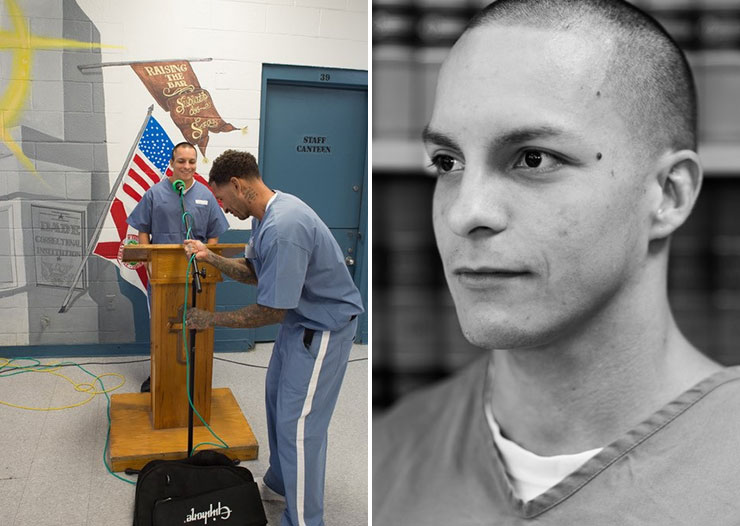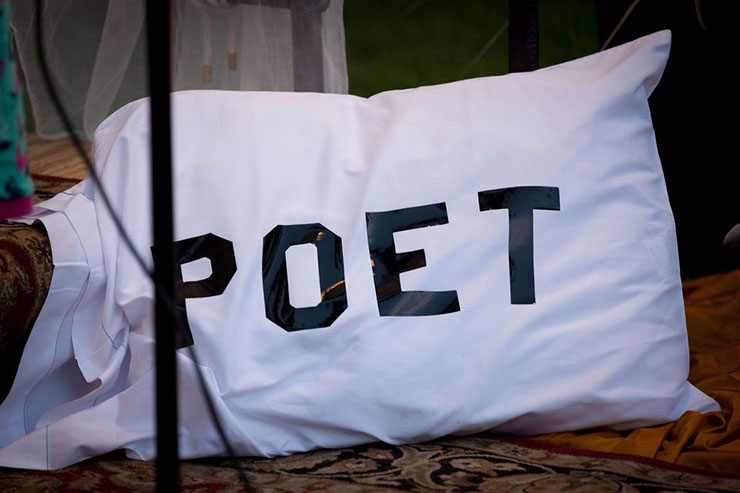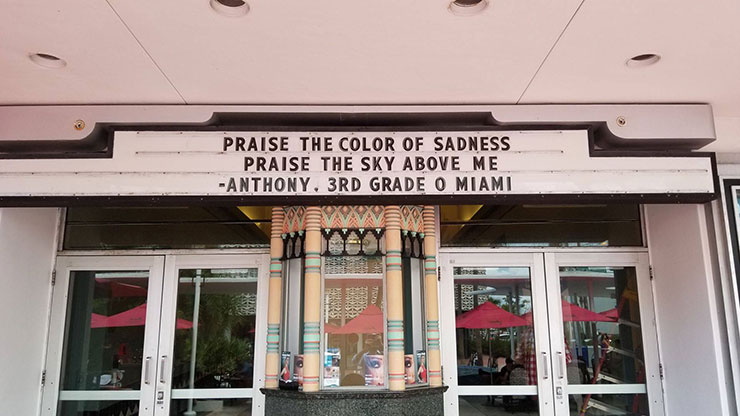
Christopher Malec is this year's Luis Hernandez Florida Prison Poet Laureate.
April brings showers of poetry to Miami as April is National Poetry Month. In The Magic City, that means the 10th annual homage to poetry, or the month-long festival known as “O, Miami.”
There are hundreds of ways to engage with a poem all throughout the city.
See The Projects. Click here.
See The Events. Click here.
Founded in 2011 by P. Scott Cunningham, himself a poet, with help from the John S. and James L. Knight Foundation the mission of the festival is for every single person in Miami-Dade County to encounter a poem.
“We're thrilled to be celebrating our tenth festival,” says Cunningham. “When Knight Foundation gave us the opportunity to create this festival, I had no idea that we'd get this far. The fact that Knight, and so many other funders, believe in what we're doing is incredible.”
“We are all lucky to be a part of something that Miami believes in,” he says.
Last year, due to the pandemic, the festival was re-organized in the span of two weeks from a live event to a virtual event. This year, the festival is working to find creative ways to inject poetry into everyday life.
According to Cunningham, most of the programming will be "poetry-in-public-places," with an emphasis on low-capacity, socially-distanced and outdoor events.
Past encounters with poetry have included poems written at the beach in sand, on the bottoms of flip-flops, wrapped in fortune cookies or inserted into seashells. The only requirements are they be “of the time” and have a sense of place (Miami-Dade County).

For this year’s decennial celebration, 45 projects will be produced in a hybrid model, with several books/zines, hosting a collection of outdoor gatherings with a small number of participants, online workshops and a bevy of poetry in public space projects.
This year’s themes are “Care and Ritual.”
Also, this year Christopher Malec has been named the second Luis Hernandez Florida Prison Poet Laureate, an honorary position named for an incarcerated Florida poet who passed away from cancer in 2018.
The title is awarded once a year by Exchange for Change and O, Miami Poetry Festival. Malec will remain Prison Poet Laureate until 2022. Responsibilities of the Laureate include writing commissioned poems for special occasions and events; promoting the work of other inmates; and acting as a representative for the incarcerated voice.
The Laureateship designates one poet currently incarcerated in the State of Florida with a mission to increase visibility of Florida’s prison population and to promote rehabilitation through the arts.
Currently, Malec is working on his first collection of poems, and his work has been commissioned by the University of Arizona’s Art for Justice project.
An excerpt from Florida Prison Poet Laureate, Christopher Malec’s poem titled, “Bruises”
...as I sat...
an envelope would fall through the flap
with your name written on the back
written whispers hinting at visits,
more missives, and the chances
of you taking me back
every time I make it back, and
those few times you appeared on the other side of the glass
and left handprints behind
you kept melting my common sense and injecting me with hope

“Most of us have no idea what it means to be incarcerated, and the news we do hear from prison is usually third-hand,” says Cunningham. “This is a population that needs a voice, and if we believe in rehabilitation, we must listen.”
Visit poetryfoundation.org or exchange-for-change.org
For the O, Miami Festival Local Miami poets will be featured on a Zoom panel on Wednesday, April 7, including Denise Duhamel, Maureen Seaton, Caridad Moro-Gronlier, Brendan Walsh and Gregg Shapiro, all of whom have new books of poetry or prose.
Duhamel, who teaches in the MFA program at FIU, released her recent book of poetry, “Second Story” (Pittsburgh, 2021). Seaton is professor of creative writing at the University of Miami and was voted Miami’s Best Poet 2020 by The Miami New Times. Her latest collection is titled, “Undersea” (JackLeg Press, 2021).
Walsh, the author of five books, has lived and taught in South Korea, Laos, and South Florida. His books include “Go” (Aldrich Press), “Buddha vs. Bonobo” (Sutra Press), and “fort lauderdale.” He is the winner of America Magazine's 2020 Foley Poetry Prize.
Moro-Gronlier, a first generation Cuban-American and professor of English at FIU and MDC will discuss her debut collection titled, “Tortillera,” (Texas Review Press, 2021), the winner of the TRP Southern Poetry Breakthrough Prize for Florida.
She counts Elizabeth Bishop, Ann Sexton, Richard Blanco, Julie Marie Wade, Pablo Neruda, Denise Duhamel, Maureen Seton and Sharon Olds as major influences.
Meeting Pulitzer-prize winning poet, Sharon Olds for the first time, Moro-Gronlier remembers becoming emotional and learning from Olds’s dictum: “A poem never killed anyone.”
“I love that,” says Moro-Gronlier. “Sharon is one of my idols. Whenever it was difficult for me to write, I would say that to myself. She imbued me with courage to speak my mind.”
And speak her mind she does.
The title alone is provocative.
“Tortillera” refers to an old Cuban expression: “Mejor una puta que tortillera,” roughly translated as “Better a whore than a dyke,” tortillera, perjoratively translating as “dyke.”
Moro-Gronlier uses the term as a way to own it and defuse it. She embarks on subjects such as race relations, socio-economic status, her marriage to a man, an affair with her lesbian lover and eventual divorce from her husband. Her self-aware poems address the queer experience of “coming out while Cuban.”
“There’s lot of Miami in the book,” says Moro-Gronlier, “and a lot of my experience of growing up as a first generation Cuban-American.”
Ten years in the writing, she says the book evokes a snapshot of a bygone era of Miami, one where she used to accompany her grandmother to Lincoln Road to buy fabric.
With strict parents, she remembers the only place she was allowed to go unchaperoned as a young girl was the library.
Her book reflects her adolescence, growing up as a girl in a patriarchal household, being a “bride-in-training,” and what she characterizes as “living life on the hyphen.” (e.g., Cuban-American).
One of the highlights of her career was taking part in the Letras Latinas Pintura Palabra project, a literary initiative at the Institute for Latino Studies (ILS), at the University of Notre Dame which strives to enhance the visibility, appreciation and study of Latinx literature.
For young poets and writers, Moro-Gronlier advises, “Read and read some more.”
“The little girl inside of me is very happy to have always been a reader,” she says. “I always wanted to connect with others the way books connected me to other people.”
Chicago-born poet and entertainment journalist Gregg Shapiro echoes Moro-Gronlier’s advice to read.
“Always be reading,” he concurs. “Keep current, go to live poetry events, pay attention and get involved with a writing community.”
The author of seven books, including the expanded edition of his short story collection “How to Whistle” (Rattling Good Yarns Press, 2021), Shapiro came to South Florida by way of Chicago and Boston, where he graduated from Emerson College in 1983.
In “How to Whistle” he shares reminisces of his times in Boston waiting tables at a dive bar called Cafe Society (aka Café Sociopath).
He credits his time at Emerson, where his mentors included comedian and then-professor Dennis Leary and his professor Bill Knott, who he says got him “addicted” to publishing.
“He taught us how to type up a clean submission letter with no typos and include a self-addressed stamped envelope (SASE) to literary journals,” he says.
“The first time you get the acceptance letter and see your name and poem in a literary journal it’s electrifying,” he remembers.
On his own personal reading list are David Leavitt’s “Shelter in Place,” “Afterparties,” a collection of short stories by Anthony Veasna So and his current all-time favorite author, Rebecca Makkai, author of “The Great Believers,” recommended to him by Amy Poehler about the AIDS crisis in Chicago during the 1980s.
He praises National Youth Poet Laureate, Amanda Gorman, who read her poetry during Joe Biden’s presidential inauguration last January with bringing attention to the sometimes neglected art of poetry.
“I’m excited to come back to O, Miami and read with my dearest writer friends,” says Shapiro, who currently lives in Ft. Lauderdale with his husband Rick and their dog Coco. “It’s a great concept and Scott Cunningham deserves a lot of credit for garnering the amount of excitement this festival generates.”
There are plenty of events going on around Miami to get involved in and you don't even have to be a poet.
For more information visit omiami.org.




